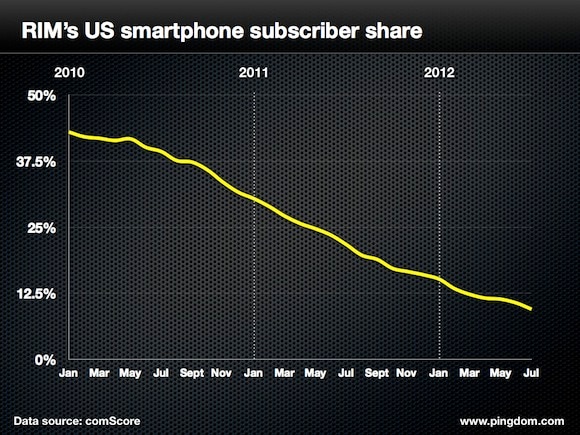
Research In Motion, makers of BlackBerry smartphones and related products, has not been in the headlines much with positive news in recent years. But the total number of BlackBerry users worldwide has, despite the bad news, kept growing, at least until now.
With the new platform, BlackBerry 10, around the corner, promising new functionality and updated handsets, is there still hope for RIM? You can decide for yourself after going through these figures.
Website traffic and search
No doubt, the story of and reasons behind RIM’s decline has been documented plenty in other places, and that’s not what we want to do here. But we noted BlackBerry’s dramatic fall in an article in June, and we wanted to return to RIM and try to look at the issue from as many sides as possible.
First, let’s look at how traffic to BlackBerry.com has fared in recent years with Google Trends for websites. As you can see, traffic was actually increasing until about a year ago. Then it leveled out, but has in recent months started to decline.

It’s worth noting that traffic to Rim.com hardly registers at all in Google Trends for websites.
We can find another example of the site’s popularity using Alexa. It’s Daily Traffic Rank shows that BlackBerry.com has a global rank of 775 over the past three months. A lower number would of course be better and the site used to hover around the 600 mark last year but is now close to 1,000.

Google Trends for search reveals a similar result when we look at RIM (the blue line) and BlackBerry (the red). It appears the interest in searching for “BlackBerry” has been in decline for a year or so.

Worth noting is that the spike in interest at the mark “D” was caused by the worldwide outages that struck RIM in October 2011.
Share of mobile web browsing
A smartphone is a mobile powerhouse, and many are used to browse the web. Even though BlackBerry’s main claim to fame is mobile messaging and email, many BlackBerry owners also browse the web with their smartphones.
According to Chitika, BlackBerry devices were used for just over 1% of mobile web browsing in the US in July 2012.

Statcounter shows a slightly more positive picture for BlackBerry and mobile web browsing, giving about 5% usage share worldwide to RIM in July. However, that’s quite a dramatic decline from the peak of almost 20% at the end of 2010.

Sales and market share
So far we’ve looked at soft numbers, like share of mobile web browsing, but in terms of judging how a company is doing, there’s nothing like counting sales and market share. Looking at Gartner’s figures for BlackBerry sales RIM enjoyed steadily increasing numbers until the second half of 2010. Since then, with a slight increase about a year ago, it’s not good news for RIM. And this year, BlackBerry sales seem to be in free fall.

The market share figures for BlackBerry OS from IDC seem to show a slightly less dramatic picture for RIM, with its market share declining since early 2009. However, increasing unit sales but declining market share would seem to indicate that the overall market grew much faster than RIM. This would most likely be explained by the growth of primarily Android and iOS.

So, sales and market share are declining. As if that was not reason enough to worry for RIM, the company’s share of the US smartphone market has seen a dramatic fall in recent years. In fact, RIM’s share of US smartphone subscriptions has fallen from over 40% in early 2010 to just below 10% today.

Share price
Finally, let’s take a look at RIM’s share price over recent years. As we write this, RIM’s share price stands at $6.18, which, although better than Nokia’s $2.74, is a far cry from Apple’s $686.90. Looking at RIM’s share price of the last five years using MarketWatch, you can again see that there is not much good news for the Canadian company.

Is BlackBerry 10 the savior?
Without a spectacular new OS and smartphones it’s hard to see how RIM will pull this off and be able to continue as an independent manufacturer for much longer. BlackBerry 10 is set to arrive early next year but will that be soon enough? There is no doubt that there are still scores of dedicated BlackBerry users that will hold out for a bit longer for an improved smartphone. But the question remains if it will be enough. Based on the range of numbers we have presented in this article, it’s hard to see anyone being really optimistic about the future for the Canadian company.
Image (top) via Shutterstock.
Read also: Gartner Magic Quadrant Observability



























